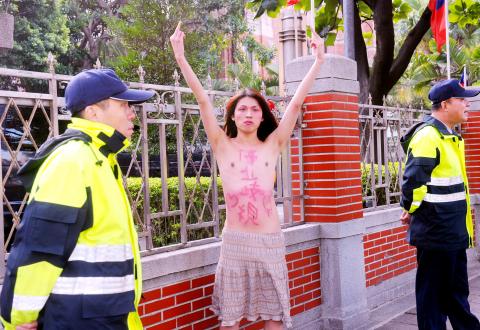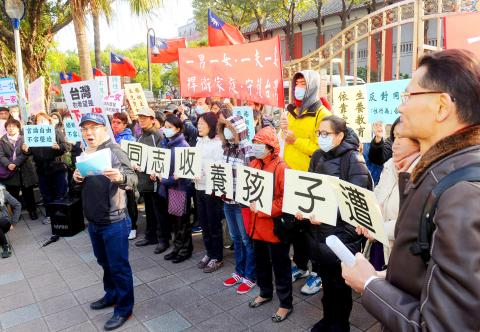A proposed amendment to the Civil Code aimed at legalizing same-sex marriage was stalled at the legislature yesterday, after it met with staunch opposition from the Ministry of Justice and Chinese Nationalist Party (KMT) legislators.
Since the legislature’s Judiciary Committee failed to hold a vote on the amendment, it will remain in limbo until the next legislative session, which is due to begin in February.
While the bill was debated, opposing rallies clashed over the issue outside the Legislative Yuan in Taipei.

Photo: CNA
Lesbian, gay, bisexual and transgender (LGBT) advocacy groups expressed their disappointment over the results, saying that many of the opposing comments from the ministry and KMT legislators seemed to “take us back in time to an unenlightened era, or a bygone century.”
The bill, dubbed the Marriage Equality Amendment, proposes to replace terms in the Civil Code denoting heterosexual couples with neutralized ones, for example replacing “husband and wife” with “couple,” which would therefore effectively legalize same-sex marriage.
Deputy Minister of Justice Chen Ming-tang (陳明堂) listed four main reasons for the ministry’s opposition to the amendment, saying that its passage would impact current marriage institutions, including population policies and inheritance principles, and introduce changes to too many laws; that it lacks social consensus and support; that it has met “strong opposition” at public hearings; and that the rights of gays and lesbians can be protected through legal reforms on issues such as medical visitation rights or taxation, without making “hasty” changes to marriage institutions.

Photo: CNA
Chen said legalizing same-sex marriage is unsuitable for Taiwan at the moment, since it goes against the nation’s “views on interpersonal ethics and morality.”
He denied allegations that the government discriminates against homosexuals, saying that the ministry would soon put forward a proposal to protect the rights of gays and lesbians “through successive phases,” adding that he was more open to supporting individual legislation than altering the Civil Code.
Democratic Progressive Party (DPP) Legislator Cheng Li-chiun (鄭麗君) compared Chen’s suggestions for separate legislation to racial segregation, saying that this would imply discrimination, not guard against it.
Cheng then asked the deputy minister what he thought about a recent music video by pop diva Jolin Tsai (蔡衣林), which features an elderly woman who is unable to sign medical papers for her partner.
Chen said that such issues could be solved through reforms conducted by the Ministry of Health and Welfare.
DPP Legislator Tuan Yi-kang (段宜康) blasted the justice ministry over its concerns that legalizing gay marriage would lead to a population decrease and asked Chen if the ministry should, by the same token, forbid heterosexual couples who are unable to bear children from getting married.
However, KMT Legislator Liao Cheng-ching (廖正井) supported Chen’s views, saying he was afraid that same-sex marriage would exacerbate problems in Taiwan’s aging society and that there would be fewer young people left to take care of senior citizens.
Liao’s remarks raised some controversy, but not as much as those made by fellow KMT Legislator Lu Hsueh-chang (呂學樟), who said he was worried that the act’s passage might encourage “startling” behavior, such as polygamy and bestiality.
Cheng responded by saying she is unsure about who is more likely to engage in bestiality: gay or straight people.
While lawmakers were gridlocked inside the Legislative Yuan, more than 100 members of the anti-gay marriage group Alliance of Religious Groups for the Love of Families Taiwan gathered outside yesterday morning, calling on legislators to block the amendment.
“Under the influence of popular culture, homosexuality might become something of a fad, like the trend of holding barbecues for the Mid-Autumn Festival,” said one member of the group, who referred to herself as “Hsiaowei’s Mom (小偉媽媽).”
The protest was interrupted by gay rights advocates several times, including by a group of about a dozen activists who picketed the group and chanted slogans nearby, shouting: “Discrimination is not [protected by] free speech.”
A transgender activist known as Miss Wu (吳小姐), who was born male, but identifies as a transgender woman, stormed through the protesting group members while wearing a skirt and nothing but red paint smeared on her upper torso. She remained mostly silent, but made obscene gestures at the anti-gay marriage protesters.
As KMT legislators currently outnumber their DPP counterparts in the Judiciary Committee nine to four, LGBT advocates speculate that the committee’s convener, DPP Legislator Yu Mei-nu (尤美女) — a leading proponent of many gender rights issues — may have strategically stalled the vote.
Taiwan Alliance to Promote Civil Partnership Rights director Victoria Hsu (許秀雯) said that although many DPP lawmakers are staunch supporters of marriage equality, several DPP committee members failed to show up for today’s meeting, while Tuan, Cheng and other vocal supporters of the amendment do not have the right to vote in the committee.
Hsu questioned if the DPP is placing enough importance on the issue, as it has yet to make a collective effort to promote same-sex marriage.
Taiwan Alliance to Promote Civil Partnership Rights secretary-general Chien Chih-chieh (簡至潔) said that given the legislature’s current composition — with the KMT commanding a majority — the amendment stands little chance of getting passed.
She added that she hopes the issue can be debated in the 2016 presidential and legislative elections, with input from third party contenders.

Taiwan is gearing up to celebrate the New Year at events across the country, headlined by the annual countdown and Taipei 101 fireworks display at midnight. Many of the events are to be livesteamed online. See below for lineups and links: Taipei Taipei’s New Year’s Party 2026 is to begin at 7pm and run until 1am, with the theme “Sailing to the Future.” South Korean girl group KARA is headlining the concert at Taipei City Hall Plaza, with additional performances by Amber An (安心亞), Nick Chou (周湯豪), hip-hop trio Nine One One (玖壹壹), Bii (畢書盡), girl group Genblue (幻藍小熊) and more. The festivities are to

Auckland rang in 2026 with a downtown fireworks display launched from New Zealand’s tallest structure, Sky Tower, making it the first major city to greet the new year at a celebration dampened by rain, while crowds in Taipei braved the elements to watch Taipei 101’s display. South Pacific countries are the first to bid farewell to 2025. Clocks struck midnight in Auckland, with a population of 1.7 million, 18 hours before the famous ball was to drop in New York’s Times Square. The five-minute display involved 3,500 fireworks launched from the 240m Sky Tower. Smaller community events were canceled across New Zealand’s

‘IRRESPONSIBLE’: Beijing’s constant disruption of the ‘status quo’ in the Taiwan Strait has damaged peace, stability and security in the Indo-Pacific region, MOFA said The Presidential Office yesterday condemned China’s launch of another military drill around Taiwan, saying such actions are a “unilateral provocation” that destabilizes regional peace and stability. China should immediately stop the irresponsible and provocative actions, Presidential Office spokeswoman Karen Kuo (郭雅慧) said, after the Chinese People’s Liberation Army (PLA) yesterday announced the start of a new round of joint exercises around Taiwan by the army, navy and air force, which it said were approaching “from different directions.” Code-named “Justice Mission 2025,” the exercises would be conducted in the Taiwan Strait and in areas north, southwest, southeast and east of Taiwan

UNDER WAY: The contract for advanced sensor systems would be fulfilled in Florida, and is expected to be completed by June 2031, the Pentagon said Lockheed Martin has been given a contract involving foreign military sales to Taiwan to meet what Washington calls “an urgent operational need” of Taiwan’s air force, the Pentagon said on Wednesday. The contract has a ceiling value of US$328.5 million, with US$157.3 million in foreign military sales funds obligated at the time of award, the Pentagon said in a statement. “This contract provides for the procurement and delivery of 55 Infrared Search and Track Legion Enhanced Sensor Pods, processors, pod containers and processor containers required to meet the urgent operational need of the Taiwan air force,” it said. The contract’s work would be